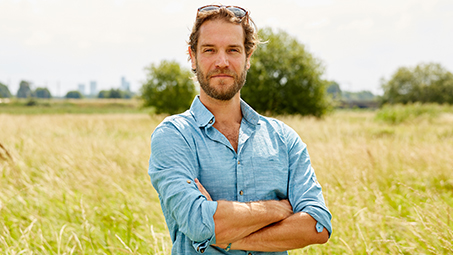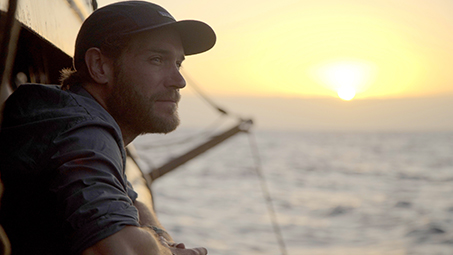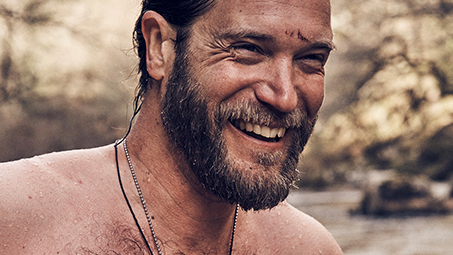We look forward to welcoming James Levelle to Turner Sims on Tuesday 21 February. Ahead of an inspirational evening with award-winning filmmaker, we share a recent Q&A with the adventurer.

Tell us a bit about your background. What inspired you to get into environmental filmmaking and documentary expeditions?
One of my earliest memories as a little boy is of pinching my parents’ National Geographic magazines, marvelling at the amazing wildlife photography, then cutting my favourite photos out to create my own eclectic animal collages. I may have made an awful mess of some beautiful magazines, but these incredible images inspired my wild imagination, and fortunately my folks didn’t seem to mind.
Years later, with school done and in need of a job, I weighed up all the ways I could possibly get paid to work in wild places and, considering my creative nature, I set my sights on documentary making. I taught myself to shoot and edit, got work experience, then hopped skipped and jumped my way up through the industry, until eventually I was given the chance to direct my first National Geographic Channel documentary series.
Making ‘Eco Crime Investigators’ was a seriously risky business because we had to go undercover in dangerous places to covertly film the criminals behind illegal wildlife trade. The flipside to this though was mind-blowingly magical because the series also gave me the opportunity to finally come face to face with some of the amazing animals I’d marvelled at as a kid in National Geographic magazine.
You have been to some incredible places over the course of your career, are there any experiences which have stood out for you?
The first documentary I made for National Geographic was about the illegal trade in tiger skins and bones, and so I travelled to Rajasthan in Northern India to film with the wildlife rangers protecting Ranthambore National Park’s big cats from poachers. Ranthambore is the most spectacular place with thick forest, crystal clear rivers, lakes, and the ruins of an ancient fort atop a rocky hilltop. I felt like I’d been magicked into a real-life ‘Jungle Book’ (my all-time favourite Disney movie and the first film I ever saw in the cinema).
I joined a team of rangers patrolling the park in their open top jeep. As we drove deeper into the jungle the muddy track narrowed and soon we were squeezed tight between the trees on both sides. The forest was eerily quiet. We turned a sharp corner and boom! Suddenly, we were a few feet away from an enormous male tiger heading straight for us. My jaw dropped and my hairs stood on end. The tiger stared straight at me and kept on coming.
I remembered the scene in ‘Jungle Book’ when ‘Shere Khan’ finds little ‘Mowgli’ and then tries to eat him. I really didn’t fancy becoming dinner, but I couldn’t move… I was transfixed.
Fortunately, this wasn’t the case for my driver, who, considerably more compos mentis than me, hit the brakes, quickly found reverse and steadily started backing up the jeep. We continued our deferential retreat until finally the tiger lost interest, stepped off the track and gracefully disappeared back into the forest. We all breathed a sigh of relief. To this day those electrifying few minutes remain the most majestic and awe-inspiring wild animal encounter of my life.

Throughout your career, you have witnessed firsthand the social and environmental challenges facing our planet, are there any causes that are particularly close to your heart, and have you made any changes in your day-to-day life to try and address them?
Over the years I’ve been fortunate enough to work in some of the wildest places on the planet and the brilliance of Nature never fails to fill me with awe and wonder. The sense of connection, vitality and belonging I experience in the wild has a tangibly positive effect on my state of being.
Unsurprisingly, wherever and whenever I encounter environmental crime it almost always goes hand in hand with social suffering, exploitation, and abuse. It’s difficult for people to feel empathy and a sense of connection to the world around them when they’re fighting to survive.
Now, I’m deeply passionate about championing and protecting Nature. In ‘Race For The Future’ I travelled over 9000 miles, fossil fuel free to inspire action in the climate crisis, but it strikes me that for as long as we fail to look after ourselves and each other there’s little chance of us looking after our environment.
But when our basic human needs are met and we’re given the chance to rediscover our connection to Nature, then the game changes completely. So, I’d say the key to protecting Nature is to help us all become healthier, happier human beings. That’s the cause closest to my heart.
When it comes to changes I’ve made in my life, I make more time to observe and appreciate Nature every day, wherever I happen to be, and when I’m at home I focus on finding kind and caring folks creating positive change local to me with whom to connect, collaborate and create a sense of community.
What can audiences expect from your talk?
I became a filmmaker because it was a good fit for my fascination with the world. I’m not sure though I ever imagined my work would be quite so dramatic, action packed and potentially deadly. However, if bonkers adventures are good for one thing it’s stories. Talking to audiences about my various escapades is great fun, but it also encourages me ask those essential questions: Why on Earth did I decide to do that? How on Earth did I do it? And what on Earth, if anything, have I learned?
Examining yourself is an interesting exercise and having done so, it turns out the answers to those questions aren’t necessarily what I’d expected…
Raising awareness about environmental issues is clearly something you are very passionate about, is there a take home message that you would like audiences to come away with?
It’s true, I’m very passionate about raising awareness of social and environmental issues, though I’d say I’m even more passionate about overcoming them. We’re living through an existential crisis so massive and overwhelming that if you try facing up to it alone you risk paralysing yourself with fear and hopeless apathy. The key thing I think is to understand you’re not alone and reaching out to good folk around you is crucial. Human history has proven that when we share a common vision and work together, we can achieve anything. I’ve put this to the test on some pretty extreme adventures and so I hope in sharing my stories I can spark a little more faith in humanity, inspire us all to dream big and encourage each of us in our own unique way to get busy transforming our dreams into reality.

Has your filmmaking created any opportunities for you to advocate for environmental issues? How can television and film help to get these messages across?
Before I worked for National Geographic, I made short documentary films for human rights and environmental NGOs and ever since advocating for these issues has been a massive motivation for me. The problem with film and television is it trends towards ‘negativity bias’. TV news can be a nightmare with its focus on doom and gloom scenarios that scare audiences to grab their attention. Fear’s a very powerful emotion. Now, if you’re in a deadly situation fear is incredibly useful because it gives you the razor-sharp focus you need to stay alive… so long as you don’t panic. So, fear is great for making us pay attention, but it’s rubbish for creative thinking and imagining new possibilities. Now I love a good drama as much as the next person, but I reckon film and television would make a massively positive impact if, instead of captivating minds with fear, it did more to liberate minds and inspire us all with extraordinary uplifting stories that champion the best of humanity.
‘He’s a nice bloke… however, he is mad.’
The Times
Do you have any tips for someone starting out in filmmaking?
The great thing about starting out in filmmaking today is that we all have access to the basic tools we need to do it, all in the palm of our hand. Mobile phones can shoot high quality video and edit the footage you’ve shot too. A lot of people think you need to go to film school to figure out how to make films, but the truth is, whilst that’s a great route for some, it’s not essential. If you think about it, we watch so many movies and TV shows that most of us already intuitively understand how to put a film together. Once you start mentally pulling the filmmaking process apart and identifying the different pieces you soon see how much you already know. Then it’s just a question of practicing what you know. Get the camera out. Start shooting. Start editing. Put the pieces together and learn from your mistakes. And for those concerned by the increasingly competitive lay of the land just remember, anyone can point a camera at stuff, but few can tell a great story. Story is everything.
Book your ticket to see James Levelle on Saturday 11 February here
Comments are closed, but trackbacks and pingbacks are open.